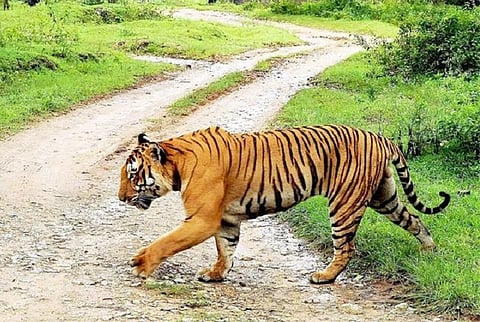Kerala to build centre to rehabilitate aged tigers that can’t hunt prey in the wild
Three months ago, Pulpally, a small town in Wayanad district of Kerala was on alert for some days owing to multiple tiger attacks on domestic animals that were reported in the area. Fears escalated when a forest watcher also came under the wild cat’s attack. However, when the tiger was finally caught, it came to light that it lacked a canine tooth and had injuries on its claw and eye. Officials pointed out that the tiger could not hunt down prey and that might be why it had scaled down to human habitations in search of food.
Over the past one year, there have been similar cases in different parts of Kerala. After these wild animals are caught, there is a need to rehabilitate them. But question is – where? The tiger that was rehabilitated from Pulpally was brought to a government-run zoo in Thiruvananthapuram, despite it not being the apt place for it. In order to address the issue, the Forest Department of Kerala has mooted the plan to build a tiger rehabilitation centre in the state.
The facility is planned to be constructed in Thrissur district near Puthur Zoological Park. Thrissur has been chosen for the facility as the location is close to Kerala Veterinary and Animal Sciences University (KVASU).
“When we usually come across this kind of situation, the animals will be given the necessary treatment if required and will be sent back to the forest. But there are cases where the animal is not in a position to hunt prey and survive in the wild. It can be because of injuries or old age. This is the reason most of the tigers come down to human settlements which leads to man-animal conflict situations,” said B Anjan Kumar, Chief Conservator of Forests (Wildlife), Palakkad.
Need for a permanent rehabilitation centre
At present, there are three tigers in captivity in Kerala, one each in in Thrissur, Thiruvananthapuram and Neyyar zoos. But experts point out that zoos are not the proper place the wild cats should be rehabilitated.
“According to Central Zoo Authority regulations, rehabilitated animals cannot be considered as an exhibit under any circumstances and so they cannot be kept in zoos,” says Anjan Kumar.
The rehabilitation centre which will be built at Thrissur will have capacity to inhabit 16 tigers at a time. Though the space will be designed specifically for the tigers, other wild animals like leopards and bears could also be rehabilitated there, if needed.
“In circumstances like disease outbreak among animals living in forest, it is required to track down those with disease so that they can be kept in isolation. Only a facility like this will provide conditions for that,” said the Chief Conservator of Forests.
The officials have also made it a point that tiger rehabilitation centres will not be open for public. “It will not have the characteristics of a zoo, and only research personnel, apart from forest officials, will be allowed in the facility,” said the official.
Forest Department officials aim to build the rehabilitation centre within a year.

